- Home
- Patricia Highsmith
Nothing That Meets the Eye Page 2
Nothing That Meets the Eye Read online
Page 2
Tomorrow what would he do? He need not worry yet about plans. Over four hundred dollars were sewn into the lining of the black valise, and with that he could afford to take his time. He could try his hand at a dozen professions. He might work as a hand on one of the outlying farms for a while, and buy his own farm if he liked it. He might set himself up in a store of some kind, or go into business with someone he would meet in the town. He could spend weeks merely living, until fate dropped instructions into his lap.
The scope of his imagination startled him, and springing up, he pressed his fist hard against his breast. He bent his intense face toward the town, and believed with all his heart that the course of his life would reveal itself within Clement. He felt like one of the figures in a heroic and documentary painting, his posture governed by determination and nobility of purpose.
“Hello,” a small voice said.
He turned around, flustered. It was a skinny, barefoot little girl in a dark dress that the wind snapped against her thighs. Even in the dimness, he could discern a big pattern in the hem which did not seem to belong to the dress. He remembered her. She was the little girl he had seen leaning against the tree that afternoon on the way to Mrs. Hopley’s.
“Who are you?” she asked.
Slowly he brought his fist down from his chest. “Who are you?” he retorted, adopting a playful adult tone.
“Freya.”
“Freya who?”
“Freya Wolstnom.”
“What?”
“Freya Wolstnom.”
“What?”
She took a deep breath. “Wolstnom. W-o-l-s-t-e-n-h-o-l-m-e.”
He pieced together the first few letters, but the rest merely fell on his ears. As had happened many times in New York, when his fares had given him addresses, his mind refused to collect what he had heard. The memory of those times, of questionings, repeatings, final mistakes, the blare of horns as he turned the cab, rose about him and he writhed in the darkness. He passed the thumb of one hand near his mouth and brought it down again.
“Who are you?” she repeated.
“Aaron Bentley.”
After a moment the child turned and walked slowly about the hillside, between him and the town. She held back with both hands the lank black hair that the wind blew over her eyes, and looked at the ground as though she sought something.
Aaron sat down and clasped his hands over his knees, thinking she was on her way to the town. But as she lingered, he called out, mainly to restore his own confidence, “Where do you live?”
She did not look up, but merely brought her arm back. “Over there.”
He could see only black forest. He looked back at her.
She was lifting her feet and parting the high grass with graceful sidewise motions like those of a slow dance. There was a stiffness in her figure, not of self-consciousness but of concentration. He felt that she noticed his least movement.
Finally, she advanced circuitously toward him up the hill. When she stopped, their heads were almost on a level. He returned her glance smilingly, then, straining his eyes in the darkness, he was surprised to see the straight line of her mouth. It seemed sad and tense and old. Behind the moving strands of her hair, her eyes were mere grayish areas, but he felt they regarded him with hostility. A sudden swimming dismay and sense of inferiority came over him, akin to that he had felt in New York, but now intensified and focused upon him by the child and the town behind her. He felt she was too contemptuous to put to him such questions as Mrs. Hopley had, that instead she faced him as an intruder upon her property.
He fumbled to open the paper bag between his feet. “I don’t suppose you’d like to share some cake with me, would you?”
“Nope,” she said. “I got to go.” She walked slowly around the hillside.
He stood up and watched her until her figure, then the pale hem disappeared into the darkness. “Good-bye!” he called out hopefully.
There was no answer.
He pushed the cake back into the bag, and made his way toward the asylum of his room.
II
He washed and dressed with a frenzied impatience, for the mightiest morning he had ever seen was thrusting through his windows.
He rushed again to the window and, gripping the sill, looked out across a green earth to the ponderous sun that staggered throbbingly upward. It blazed on the tops of trees, the ridges of roofs, the wings of flying, singing birds. He put out his hand and fingered the leaves of the tree. He surveyed a world untouched by greed, bitterness, or the smut of commerce. The lost paradise of brotherly love.
Pirouetting on the gray carpet, he clapped his hands above his head and laughed for delight. Refreshed by his sleep in the pure air, he felt strong as an ox, fit as a warrior, free as—as the butterfly which, as he watched gapingly, fluttered in by one window and out by another.
Morning aromas of fresh coffee and of frying ham, the sound of families’ voices drifted from open windows as he strode toward Trevelyan Boulevard. In an ecstasy of contentment, he stopped to admire a tightly coiled rosebud that projected over the walk. It was of so delicate a shade of green, he hardly dared raise it with the tip of his finger.
“What will I be doing,” he asked himself aloud, “when its petals are unfolded?”
Suddenly, as he filled his lungs, he realized he had not thought of smoking since he had got off the train. Yet in New York, he had smoked all day and even in bed. It was overwhelming proof of the town’s purifying power. And beginning today, he decided, he would set himself to grow his nails.
“’Am ’n X?” Mac greeted him over the heads of a noisy row of customers. “Got extra-good ham this mornin’.”
Aaron nodded. He did not feel like talking. He was struck by the contrast of this breakfast with those of New York, with the bolted coffee and doughnut taken standing up, one eye on his cab at the curb. He had never succeeded in being indifferent, as other drivers were. Probably, he thought, it was because he had always had to eke the most out of whatever he worked at. Ever since he had left school to support his mother and himself, he had been working like a madman. He had been a soda jerk, bellhop, a waiter in a number of places, and for the last four years a taxi driver—all jobs in which good service meant tips, but the constant jumping had so torn up his nerves, it was a wonder anything was left of him. He had never had time to think of marriage. There had never been an extra quarter to take a girl to a movie! Then, after his mother’s death, he supposed the habit of hard work had persisted. And for the last few months, reaching a sort of crisis of loneliness and depression, he had saved his money as though toward some goal. “You’ve got to have a goal!” he had often muttered to himself, as he slammed the door of his cab for the last time at night. All day he would have been driving people to certain goals, but as for himself he had had none, except a shabby furnished room somewhere. Maybe this was the goal, he thought, a small town and peace of mind. It was enough. At thirty-four, there was still time to make something of his life.
Down the line of stools someone burst into genial guffaws.
Aaron smiled. He felt he had not relaxed in seventeen years. He slipped the fork slowly, with relish, under his scrambled eggs.
After breakfast he strolled along Trevelyan Boulevard, examining store windows as he might have the counters of a museum. He looked at all the sports photographs in the barbershop window, then stepped in to get a shave and a haircut.
Pete McNary, the redheaded barber, was a talkative fellow, and they had exhausted a dozen topics and had begun to talk about themselves before he finished Aaron off with a dusting of white, sweet-smelling powder.
“Say, I know a couple of faams around here might could use somebody,” Pete offered, folding Aaron’s bib sheet meticulously against his big body. He was an ox of a man, but with pink precise hands and an air of grace i
n handling his body. “Ain’t likely ’ll be seein’ the faamers soon, but we can get a ride out some afternoon when I close up and talk to ’em. You just let me know.”
“All right,” Aaron said with enthusiasm. “Thanks.”
But he was not done exploring. He would want many more idle days.
Above Trevelyan Boulevard, vanishing into green meadow and forest, lay the most attractive roads Aaron had ever glimpsed. He rambled them till midafternoon, stopping to fondle pet calves tethered in front yards, to chat with a housewife canning blueberries in an open-doored kitchen, to attend the milking of seven goats, as he sat on the hay-littered threshold of the barn. He brought handfuls of fresh grass and distributed the bunches equally among their eager mouths. He learned the best-yielding breeds of goats, the market price, the fat content and by-products of goats’ milk.
“You might like a taste now’t you know all about it,” the goat farmer said, returning from his kitchen with a slab of brown cheese on white bread.
The bread was warm and bent in his hands. Never had he eaten anything so delicious. The moments at the goat farm seemed to complete a transformation. Actually, he was elated beyond the power to think, but he realized one thing, that he had never before enjoyed merely the fact that he existed.
III
The twelve o’clock whistle of the leather factory began a white-breathed scream that carried easily over the entire town, and under its cover, as he walked a quiet road beside the river, Aaron opened his mouth and shouted his happiness. He heard mountain after mountain echo the whistle until its circle expanded beyond his sense.
Five men walked from the dark shadow beneath the factory shed. They wore blue work shirts and blackened trousers and caps. In long slow-climbing strides they came up the greasy slope to the bridge road that led to Trevelyan Boulevard.
“Howdy!” one called to Aaron, and the others followed suit and spoke or waved a greeting.
Aaron leaned against the brick back of the general store and watched them with a kind of envy and awe, these sole representatives of the armies of factory workers that cover the earth. They did not carry lunch pails, nor would they go to a crowded cafeteria for their meal. Their homes were only around the corner, where a woman would now be setting home-cooked food on a table. He blinked his popping eyes at them as they rose like giants at the crest of the road, then dispersed.
IV
“Hello.”Aaron turned from the bridge window and saw Freya standing on the wooden floor. “Hello.” He smiled, genuinely glad to see her. “How are you?”
“Okay.”
She came on her bare feet into the bar of sunlight to the window at which he stood. He could see fine dark hairs on her delicate arms, and freckles across her thin, pointed nose. Her eyes were large and of a clear milky gray that suggested blindness. She wore the same lavender dress with the broad hem patterned with strawberries.
“Want me to lift you up?” he asked.
“Nope.” She boosted herself to the sill, resting her weight on her forearms.
The whistle sounded, from the top of the giant stack, and though it split their ears at this proximity, Freya remained motionless throughout it, staring downstream.
Aaron forgot to watch the five men. He had formed the habit of attending the twelve and four o’clock whistles, for the punctuality of the change of shifts was pleasant to observe in the town where nothing else seemed governed by clocks. But now he could not take his eyes from the little girl. He had forgotten her since the first evening, and now he was grateful she had troubled to stop and speak to him.
“That’s my favorite house to visit,” she told him.
He looked where she pointed and saw a house he had not noticed before, set back at the edge of the forest. It was white with a purplish roof, and its windows were slaty in the shadow.
“Is it? Who lives there?”
“Nobody.”
“Oh.”
“Want to go see it?”
“Sure.”
She hopped off the sill. He followed her down past the factory and up a grassy slope.
The house seemed brand-new, but the white walls were streaked here and there with rain, and grass grew high as the downstairs windowsills. Aaron tramped contentedly through the grass beside the little girl, who gazed up at the windows as she walked.
Finally she stopped before the red front door. “Now we can go in.”
They walked into a bare house that smelt of paint and closeness. The varnished floors were unmarred save for small dusty bare-feet tracks. Freya told him in whispers which room was which. Upstairs, she pointed out the bedroom where, she said, the murderer had killed the beautiful wife who had just come to live in the house with her husband.
“The murderer lives here now—in the cellar!” Freya whispered.
“Does he?” Aaron asked softly. For an instant he had believed it.
“That’s why we have to be quiet, even though we put three circles around the house.”
He followed her into the attic.
“See this window? This is where the husband yelled for help the night his wife got murdered, only he was so scared he couldn’t really yell so nobody heard him.”
Aaron looked at the window. He could see the frantic husband screaming and making no sound. The husband wore pale-colored pants like riding breeches, and his black hair was tousled over a handsome head. He looked back at Freya.
“Then the husband fell asleep and had awful dreams, and woke up and ran over the mountains and never came back.” Her mouth was stern as it had been the night on the hills, and her eyes held the sad memory of tragedy. “Now we better go.”
He helped her to close the stiff front door. They walked through deep grass to the road that went into town. She did not talk anymore to him or appear even to notice him, but her acceptance of his company sufficed for Aaron. As they walked, a sense of companionship with her grew in him. And as if to balance some scale in his emotions, a realization of his loneliness came, too. He rejoiced in both sensations. They were an addition to his heart.
On Trevelyan Boulevard, Freya walked more slowly and looked into shop windows.
“See anything you like?” he asked brightly as she stopped before the jewelry shop window.
“Nope.”
She moved on and he walked beside her, thinking he might return to the jewelry shop and buy some little thing for her.
She stopped under the marquee of the movie theater and looked at the panels of stills. The stale, organic, and faintly sweetish aroma common to all theaters, which had thrilled Aaron under marquees in New York, came now through the open doors of the Clement-Olympia.
“Let’s go in!” he said.
To share with her the excitement of strange locales, the surprises of the unfolding story, now that he was free of the banality to which he had always been compelled to return, seemed the very highest pleasure.
“I don’t feel like it,” Freya said calmly.
Aaron swallowed, and uncertainly followed her as she moved on.
At the drugstore corner, she stopped and looked up at him. “Well, I’m goin’ home.”
He was confounded, now that the moment had come. “Wouldn’t you like a soda or something first?”
“Nope.” She pushed her hair back. “I know a place almost as good as the house to visit.”
“Where?”
“It’s up the river.”
He looked, but could not see any kind of structure beyond the bridge.
“Maybe we’ll go there tomorrow.” She stepped off the curb. “Good-bye, Arn.”
He was so astonished by her use of his name, by the fact she remembered it at all, he could only stand looking after her with a fatuous smile.
When he turned and walked away, a figure strolled into his path.<
br />
“Eve-nin’!”
It was George Shmid, the man who had been on the porch the day Aaron came to Mrs. Hopley’s.
“Evening,” Aaron repeated.
George fell in with him. “Got a new friend,” he said.
“What?” Aaron looked down into George’s alert blue eyes, which were fixed upon him smilingly.
George repeated the sentence. His thick lower lip, which he moistened continually, curved up at the corners in a lyre shape. “You know, the kid you was with.”
“Oh, Freya.”
“That’s right.” George smiled.
They turned onto Pleasant Street. It had begun to rain lightly, but the rain pattered on the leaves as on a roof, and not a drop came through.
“Where’d you go explorin’ today?”
Aaron glanced at him again, remembering that he had told Mrs. Hopley, when she asked him how he spent a certain day, that he had “been exploring.” Still, he could not make himself listen to George with interest, and he did not care. He was too happy in himself to want company. With a vague, half-polite smile, he turned in at the cement walk, lengthened his steps and left George, still murmuring, behind.
V
From that day forth, Aaron’s happiest hours were those he spent with Freya. They encountered each other almost every day somewhere in the town, and because they never arranged a meeting place or time, their encounters were casual surprises. They greeted each other as though they had merely stepped across a room. Clement was the room, filled with heroic furniture, interesting bric-a-brac, and magic carpets. Clement was their entire world.
The place up the river which Freya had mentioned was a deserted knife factory. It was a long, low building made of narrow boards once painted red. The stilts at the rear had given way and those in front had been uprooted, so it seemed the place had been half successful at suicide by plunging into the river. Aaron and Freya used an old ladder to enter through a side door.

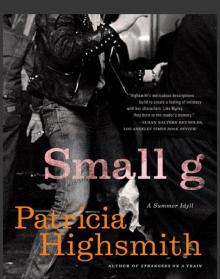 Small G: A Summer Idyll
Small G: A Summer Idyll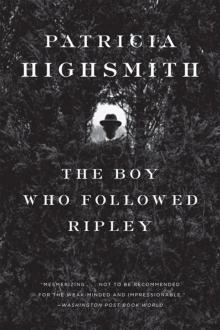 The Boy Who Followed Ripley
The Boy Who Followed Ripley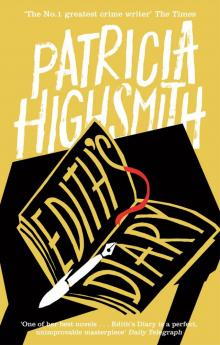 Edith's Diary
Edith's Diary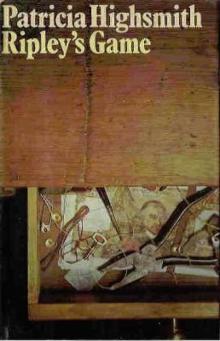 Ripley's Game
Ripley's Game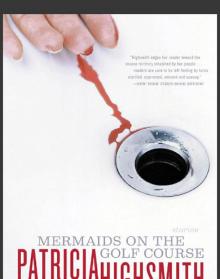 Mermaids on the Golf Course: Stories
Mermaids on the Golf Course: Stories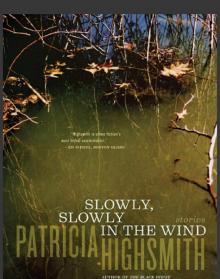 Slowly, Slowly in the Wind
Slowly, Slowly in the Wind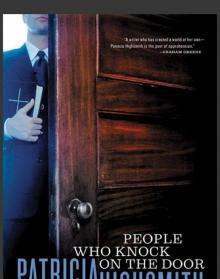 People Who Knock on the Door
People Who Knock on the Door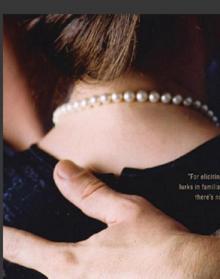 The Glass Cell
The Glass Cell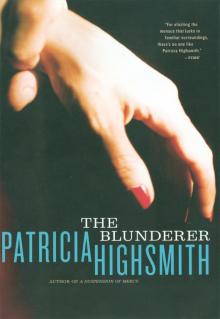 The Blunderer
The Blunderer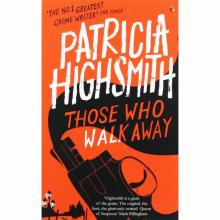 Those Who Walk Away
Those Who Walk Away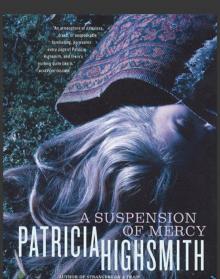 A Suspension of Mercy
A Suspension of Mercy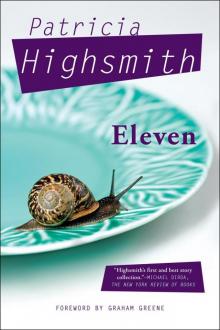 Eleven
Eleven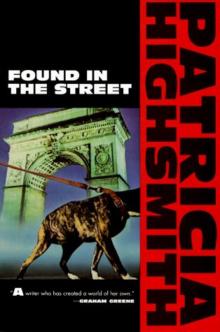 Found in the Street
Found in the Street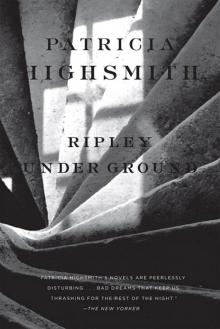 Ripley Under Ground
Ripley Under Ground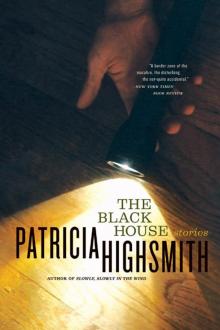 The Black House
The Black House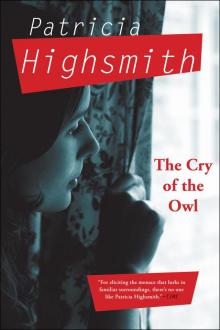 The Cry of the Owl
The Cry of the Owl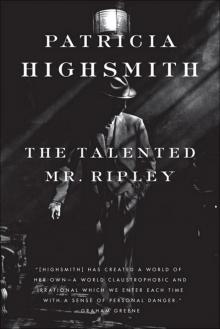 The Talented Mr. Ripley
The Talented Mr. Ripley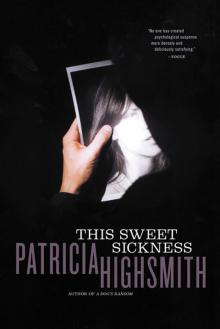 This Sweet Sickness
This Sweet Sickness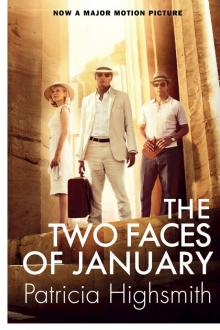 The Two Faces of January
The Two Faces of January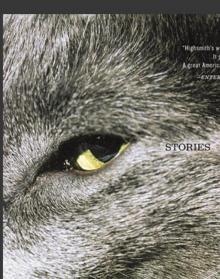 The Animal-Lover's Book of Beastly Murder
The Animal-Lover's Book of Beastly Murder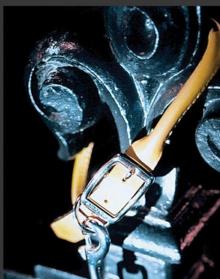 A Dog's Ransom
A Dog's Ransom Deep Water
Deep Water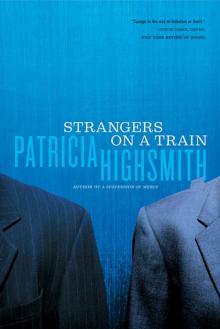 Strangers on a Train
Strangers on a Train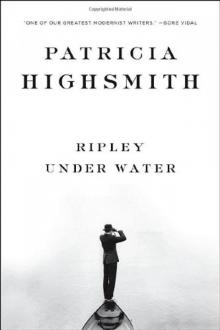 Ripley Under Water
Ripley Under Water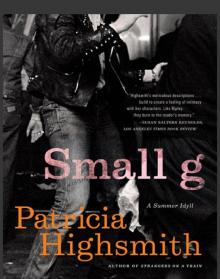 Small g
Small g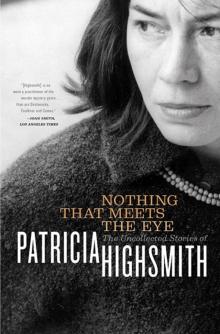 Nothing That Meets the Eye
Nothing That Meets the Eye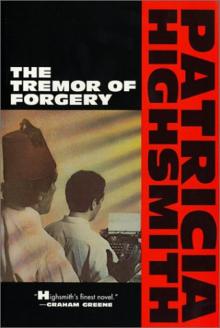 Patricia Highsmith - The Tremor of Forgery
Patricia Highsmith - The Tremor of Forgery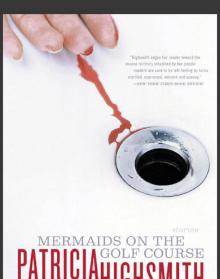 Mermaids on the Golf Course
Mermaids on the Golf Course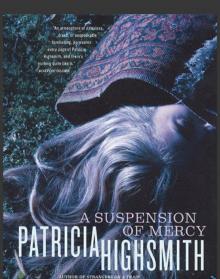 Suspension of Mercy
Suspension of Mercy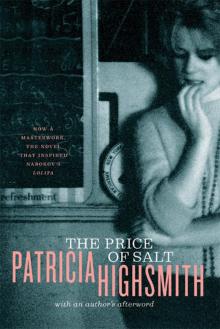 The Price of Salt, or Carol
The Price of Salt, or Carol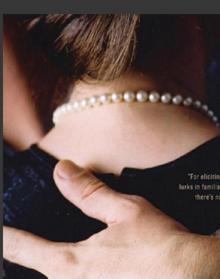 Glass Cell
Glass Cell